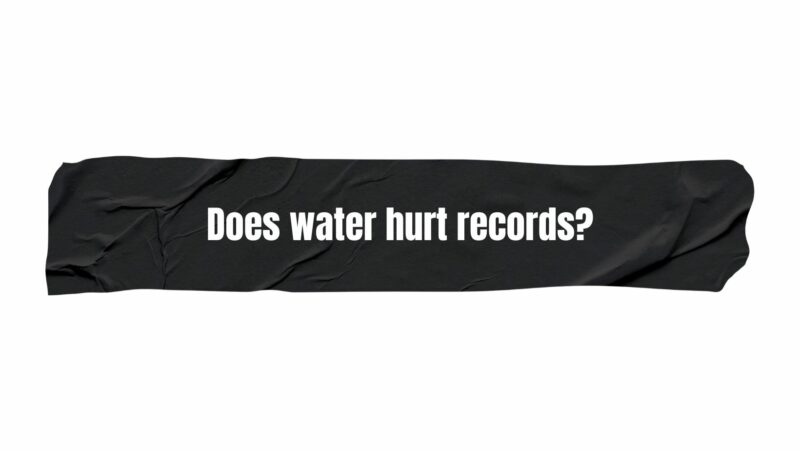Vinyl records stand as an emblem of nostalgia, connecting us to a bygone era of music appreciation. The distinct warmth and resonance of vinyl playback evoke cherished memories and a unique listening experience. However, amid the reverence for these analog relics, a lingering concern persists: Does water hurt records? This article embarks on a journey to unravel the relationship between water and vinyl records, delving into the potential risks, the science behind it, and strategies for preserving these treasured musical artifacts.
The Intricacies of Vinyl Records: To comprehend the impact of water on vinyl records, it’s essential to grasp the intricate nature of these audio wonders. Vinyl records consist of polyvinyl chloride (PVC), a flexible material prone to distortion under the influence of temperature, humidity, and liquid exposure. The grooves on the record’s surface store the audio information, and any interference in these grooves can significantly affect playback quality.
Understanding the Impact of Water: Water, while essential for life, can pose a threat to vinyl records. Direct exposure to water can lead to an array of issues, including warping, mold growth, and degradation of the vinyl material. Warping occurs when uneven moisture absorption causes the record to lose its flat shape. Mold, a common consequence of water exposure, thrives in damp environments, causing discoloration, odors, and structural damage.
Water and Groove Damage: The intricate grooves on a vinyl record are its lifeblood, containing the intricate musical information that creates the captivating sounds. When water comes into contact with these grooves, it can disrupt the delicate geometry and structure, leading to surface noise, skipping, and overall compromised sound quality. The physical properties of water and its ability to seep into crevices exacerbate the potential harm it can cause.
Cleaning vs. Water Exposure: While water seems like a viable cleaning agent, it’s not the ideal choice for maintaining vinyl records. Cleaning records requires a balanced approach that eliminates dirt without compromising the grooves’ integrity. Water alone can introduce minerals and impurities to the record’s surface, which can lead to scratches and erosion over time. Thus, water alone is not recommended for cleaning vinyl records.
Appropriate Cleaning Techniques:
- Dry Brushing: Using a carbon-fiber brush, you can gently sweep away loose dust and debris from the record’s surface. This method is an excellent starting point for regular maintenance.
- Record Cleaning Solutions: Specialized cleaning solutions are formulated to lift dirt without damaging vinyl. These solutions can be applied using a soft, lint-free cloth or a dedicated cleaning pad, following the grooves’ direction.
- Record Cleaning Machines: For audiophiles and collectors, record cleaning machines offer a meticulous and safe cleaning method. These machines combine cleaning solutions with vacuum suction to extract dirt without exerting force on the grooves.
Distilled Water in Vinyl Maintenance: While water has limitations in vinyl care, distilled water can play a role when used judiciously. Distilled water lacks impurities and minerals, making it a safer option for vinyl maintenance. When combined with record cleaning solutions, distilled water can dilute the solution’s potency, allowing for a gentler cleaning process. However, the application should be precise, ensuring excess moisture is avoided.
Guarding Against Water Exposure: Prevention stands as the cornerstone of preserving vinyl records. Storing records in a cool, dry environment away from direct sunlight, humidity, and potential sources of liquid is vital. If water does inadvertently come into contact with a record, swift action is paramount. Carefully blotting the affected area with an absorbent, lint-free cloth and allowing the record to air-dry can mitigate potential damage.
Conclusion: Vinyl records are more than just a mode of listening; they embody a cultural and historical significance that resonates through the years. The question of whether water can harm records holds implications that extend beyond surface-level concerns. As enthusiasts seek to enjoy and preserve these musical artifacts, it’s crucial to recognize that water can indeed harm vinyl records due to their sensitive composition. Embracing proper cleaning techniques, leveraging distilled water with care, and adopting preventive measures all contribute to safeguarding the delicate balance between maintaining records’ condition and appreciating their timeless sound.


